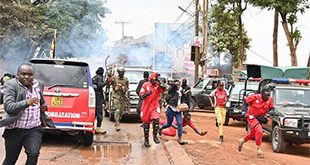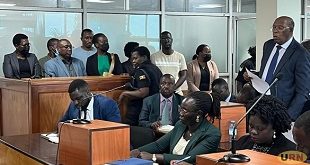Presidential Petition PRE-TRIAL
Agreed facts
Fact 1: There was an election conducted by the EC on February 18 2016
Fact 2: On Feb 20, 2016, President Museveni was declared as validly elected President
Fact 3: On Feb 20, 2016, the petitioner was declared to have polled 1.43% of the valid votes cast.
Disagreed
Disagreed fact 1: Whether EC relied on any results from the polling station as a basis to declare President Museveni winner on the 2016 polls.
Disagreed fact 2: whether the petitioner is entitled to the preliminary relief for votes recount in the areas indicated in the petition.
Disagreed fact 3: Whether there was a national voters register compiled, maintained and updated by EC for the 2016 elections.
Agreed issues within the parties for court to consider:
- Issue 1: Whether there was non-compliance with the law in the conduct of the February 18, 2016 election.
- Issue 2: Whether the elections were not conducted in line with principles of presidential and election Commission Acts.
- Issue 3: If the non-compliance with relevant laws is proved, did that affect the elections in a substantial manner
- Issue 4: Whether offense in the Presidential Elections Act was committed and were done with President Museveni’s approval
- Issue 5: Whether the Attorney General is properly joined as a party in this petition
- Issue 6: Whether the petitioner is entitled to any of the reliefs sought

Lawyers from both sides in the Uganda Election Petition have agreed on six issues for the Uganda Supreme Court to consider when the hearing starts on Monday.
The grounds are: Whether there was non-compliance with the law in the conduct of the February 18, 2016 election; whether the elections were not conducted in line with principles of presidential and election Commission Acts; If the non-compliance with relevant laws is proved, did that affect the elections in a substantial manner?.
The other issues the court will rule on are, whether offense in the Presidential Elections Act committed were done with President Museveni’s approval; whether the Attorney General is properly joined as a party in this petition and whether the petitioner is entitled to any of the reliefs sought.
The issues were presented to the nine justices of the Supreme Court led Chief Justice Bart M. Katureebe Thursday at the second pre-trial conference – a meeting where the time table for the petition was agreed.
The eight other justices on the petition are justices Jotham Tumwesigye, Dr. Esther Kisaakye, Mary Stella Arach-Amoko, Augustine Nshimye, Eldad Mwangusya, Rubby Aweri-Opio, Faith Mwondha and Prof. Lillian Tibatemwa Ekirikubinza.
The Supreme Court set Monday, March 14, 2016 to start the hearing of the high-billed presidential election petition filed on March 1, 2016 by one of the former contestants, Amama Mbabazi.
Mbabazi came third in the presidential race behind Dr Kizza Besigye and Presient Museveni but petitioned the Uganda Supreme Court citing irregularities in the elections.
He sued Museveni jointly with the Electoral Commission and the Attorney General seeking to nullify the February 18, 2016 presidential results.

Mbabazi fail to explain affidavit delay
While Monday’s pre-trial conference was dominated by a request by the Mbabazi lawyers for their petition to be amended, which was accepted and they walked away triumphant, they were yesterday at the wrong end of criticism from the Chief Justice, and the respondents.
Katureebe refused to grant a request by lead lawyer Mohammed Mbabazi for an extension for their submission of affidavits beyond yesterday. He said the affidavits should have been submitted last week, and the excuse of a break in of their offices would not be relevant to explain the delay.
“Why are you messing up the petitioner’s case? That is what you are doing,” he charged at the Mbabazi lawyers as they struggled to explain the delay.
“Where are these affidavits and why have you not complied with the direction of the Court?”
Michael Akampurira claimed they spent the entire day reassembling the essential evidence following break-in that their team blamed on the Uganda Police.
Akampurira, in reply to the CJ’s demands for the affidavits, said “if I recollect I instructed someone to deliver petition.”
At that point, The Chief Justice wondered if they needed to handle the petitioner’s case a little more seriously.
Rukutana dismisses Mbabazi accusations
Earlier, Mwesigwa Rukutana for the Attorney General had said allegations of the break-in at the Mbabazi lawyers’ chambers and arrest of witnesses, were false.
“I wouldn’t be surprised if alleged break-in was stage managed to cover up gaps or buy time,” charged Rukutana.
He also deemed all disagreed issues superfluous as they are properly covered in the agreed issues. Some of the disagreed matters, he said, can be covered during arguments on issues of non-compliance.
Basalirwa for the petitioners defended his team, saying positive action has since been taken on the arrested witnesses and they were released, so it is no longer an issue of contention.
The Chief Justice ruled that state agencies must investigate and take action if any witnesses are being harassed .
On disagreed facts, lawyer Mohammed Mbabazi said they are fundamental issues that cannot be ignored.
Court reconvenes briefly on Saturday to hear two applications by the Law Dons and Civil Society to join the petition as Amici Curiae (friends of court).
The Electoral Commission was also challenged to avail the DR forms by Saturday.
Mbabazi insisted that “we want the tally sheets signed by returning officers and witnessed by the agents, not the ones signed by EC boss, Dr Kiggundu.”
The laws governing presidential poll petitions allow the court only 30 days to hear and determine a petition.
President Museveni was on February 20, 2016 declared the winner of the presidential race with 60.62% of the votes, followed by Dr. Besigye, (35.61%), while Amama polled 1.39% of the total votes cast.
 The Independent Uganda: You get the Truth we Pay the Price
The Independent Uganda: You get the Truth we Pay the Price


